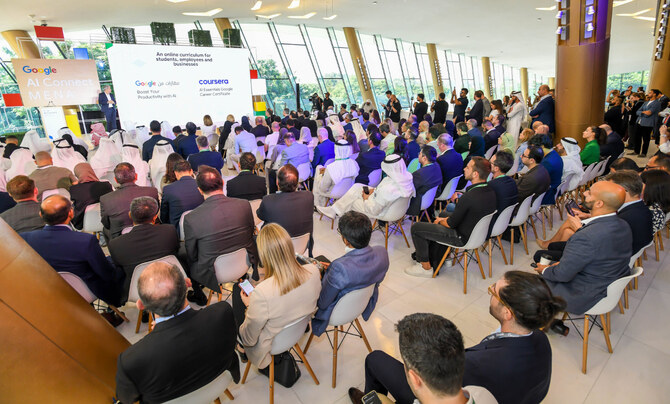
- ARAB NEWS
- 05 Jul 2025

DUBAI: As artificial intelligence rapidly reshapes industries, job roles and skill requirements, the Middle East and North Africa region is actively embracing advanced technologies and collaborating with tech giants to bridge the skills gap in an evolving labor market.
One such collaboration is with Google’s newly launched AI Opportunity Initiative, which offers training and education opportunities to make AI technologies more accessible and inclusive across the region.
By collaborating with local organizations, the AI Opportunity Initiative seeks to “train half a million people in the next two years,” Anthony Nakache, managing director of Google MENA, told an audience at the recent AI Connect MENA event at Dubai’s Etihad Museum.
To achieve this, Google “will give a grant of $15 million to fund local organizations,” Nakache said.

Najeeb Jarrar, regional director of marketing at Google MENA, told Arab News: “We are very excited about this AI Opportunity Initiative, especially since we are seeing the Saudi community is fully embracing AI both on the consumer side and on the developer and resource side.
“This is an initiative that we have launched globally and we now are bringing to the region. One of the aims of this initiative is how we are leveling the playing field for AI and AI education and skilling across the entire region,” he added, noting that students will learn to use AI more productively, including skills such as prompt engineering.
To bridge the digital divide in the labor market, Google’s AI Opportunity Initiative aims to upskill underserved workers in AI by offering tailored training materials in Arabic, in partnership with the non-profit Manarat, online course provider Coursera, and other organizations.
Google’s largest AI project in the region, the AI Opportunity Initiative will focus on four key areas: AI skills development, research, products, and infrastructure.
“We also worked with local NGOs and local players in the market to ensure that we are also reaching out to different partners,” Jarrar said.
Google.org, Google’s philanthropic arm, has announced plans to contribute $15 million between this year and the end of 2027, providing funding to organizations across the region to ensure accessibility to AI opportunities.
The AI Opportunity Initiative also aims to equip 500,000 people in the MENA region with AI skills in the first two years. This includes students, academics, developers, entrepreneurs and underrepresented groups.
Speaking about the issue of accessibility, Jarrar said: “We wanted to ensure first that this local initiative does not feel like an initiative that is hard to get for the average user.”

He pointed out that both language and local partners, such as Injaz and Raspberry Pi Foundation, play a major role in improving accessibility.
“The content is all in Arabic, we have local examples that we are actually able to showcase,” he said. “We are partnering with local partners that know the market and the community very well and are able to reach more people that are beyond what we can initially reach to.”
The AI Opportunity Initiative enables Google to expand the Maharat min Google program, which targets high school and university students, by introducing a new AI curriculum in Arabic.
As part of its mission to support underserved communities, Google.org is funding Village Capital, a non-profit that supports entrepreneurs tackling environmental, social and economic challenges.
Village Capital will equip business support organizations to offer AI upskilling opportunities to underserved workers.
The program targets women, youth, migrants and rural communities across Saudi Arabia, the UAE, Qatar, Jordan, Palestine, Egypt, Tunisia, Morocco, Lebanon, Bahrain and Iraq.
The Raspberry Pi Foundation will use grant funding from Google.org to train teachers in AI literacy, equipping students aged 11-14 in the region with AI safety skills to better understand and navigate the challenges of AI technologies.
Speaking at the Google AI Connect Event, Ruth Porat, president and chief investment officer for Alphabet and Google, said: “AI is estimated to contribute $320 billion in economic growth for the Middle East by 2030.
“Google is working to ensure that people and communities throughout the region have the skills needed to capture the upside of this emerging technology.”
She added: “Our local non-profit and university partners will help bring this program to people and communities throughout the region, ensuring that everyone can benefit from the opportunities that AI can deliver.”

Since 2005, Google has invested more than $400 million in academic research globally.
The tech giant also announced during its Dubai event the launch of new Arabic AI products, including Gemini Live in Arabic, Gemini for Teens, Imagen3, and Gems on Gemini in Arabic.
“For the previous year, we have worked hard with partners, with experts globally and from the region, to understand what are the constraints that we need to implement to make this product safer for teens, teens aged 13 to 18,” Jarrar said.
“We worked tirelessly to make sure we have the right guardrails to ensure that we had the right controls and the proper Q and A and testing, and today we are happy to say that Gemini for Teens is available for users and teens here in the region.”
These efforts are expected to support Saudi Arabia’s ambition to become an AI leader, ensuring its population stays aligned with the latest developments in the labor market.
A September report by the Saudi Authority for Data and Artificial Intelligence showed that 75 percent of the Saudi population is familiar with the concept of AI, and 64 percent are aware of its applications.